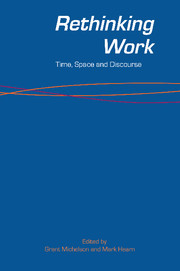Book contents
- Frontmatter
- Contents
- Tables and Figure
- Contributors
- Editorial Statement
- Abbreviations
- 1 Going to a New Place
- PART I TIME
- 2 Time and Work
- 3 The Gender Agenda
- 4 Regulation and Deregulation in Australian Labour Law
- 5 Diversity and Change in Work and Employment Relations
- 6 Transactions in Time
- PART II SPACE
- PART III DISCOURSE
- COMMENTARY
- Index
2 - Time and Work
Published online by Cambridge University Press: 05 June 2012
- Frontmatter
- Contents
- Tables and Figure
- Contributors
- Editorial Statement
- Abbreviations
- 1 Going to a New Place
- PART I TIME
- 2 Time and Work
- 3 The Gender Agenda
- 4 Regulation and Deregulation in Australian Labour Law
- 5 Diversity and Change in Work and Employment Relations
- 6 Transactions in Time
- PART II SPACE
- PART III DISCOURSE
- COMMENTARY
- Index
Summary
The cry is heard among many from different walks of life that we do not have enough time to do everything we want. There are the pressures of paid work and the need of many to juggle employment with household demands, volunteer work and leisure. We are witnessing an intense ‘space-time compression’ (Harvey 1989: 285) due to faster transportation, the internet, communication satellites and the increasing speed of money markets. Against the background of these concerns, this chapter explores the issues of time and work. Time can described ‘as a nonspatial dimension in which events occur in apparently irreversible succession from the past through the present to the future’ (Ancona et al. 2001: 514). There are many different types of time and humanity has shaped the perception of time. People designed the hours, days and months. Historians also classify past time into eras.
The chapter emphasises the need to consider time when dealing with the issues related to the world of work. There are two temporal dimensions of work: temporal boundary and temporal content. The temporal boundaries of work are the lines that divide work from leisure and paid work from unpaid work. How many hours or days do we work for payment in a week? How much annual leave and how many holidays? How much unpaid work at home is divided on the basis of gender and class?
Information
- Type
- Chapter
- Information
- Rethinking WorkTime, Space and Discourse, pp. 21 - 38Publisher: Cambridge University PressPrint publication year: 2006
Accessibility standard: Unknown
Why this information is here
This section outlines the accessibility features of this content - including support for screen readers, full keyboard navigation and high-contrast display options. This may not be relevant for you.Accessibility Information
- 4
- Cited by
